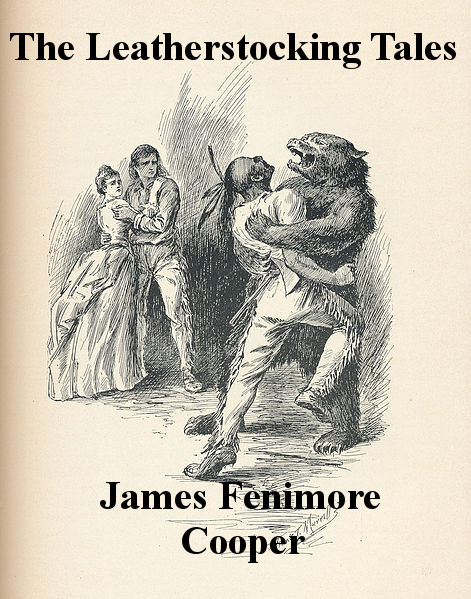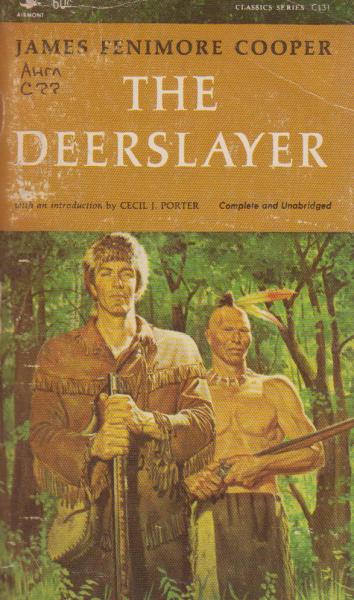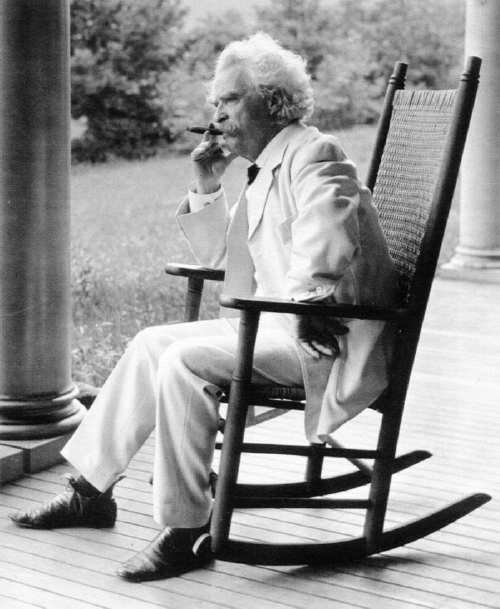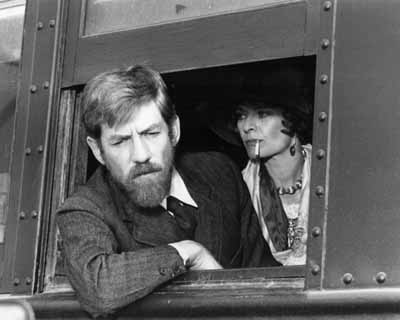 |
Craig White's Literature Courses Critical Sources selections from Mark Twain & D.H. Lawrence
two different historical-critical perspectives on |
 |
The writings excerpted below by American Realist writer Mark Twain (1835-1910) and British Modernist novelist and poet D. H. Lawrence (1885-1930) stand as major but distinct evaluations of James Fenimore Cooper (1789-1851) in the generations after Romanticism.
Twain's and Lawrence's criticisms of Cooper reflect the styles and values of the three different literary periods in which Cooper, Twain, and Lawrence wrote.
Cooper's Leatherstocking Tales (e.g. The Last of the Mohicans and The Deerslayer) embody the styles and values of the Romantic period. The forest settings in which the Tales take place were mostly imaginary, and Cooper's characters were largely heroic types motivated by honor.
Twain was 16 when Cooper died, and he came of age as a writer after the Civil War, when Romantic style faded in favor of Realism, which advocated more everyday settings and more complex characters motivated less by honor than by survival, money, and conflicted consciences, as in Twain's Adventures of Huckleberry Finn (1884).
Lawrence was an English writer, born 50 years after Twain in 1885, whose novels (including Sons and Lovers, The Rainbow, & Women in Love) transitioned from a late Victorian-Realist style to that of Modernism, which emphasized the primitive, mythic, and unconscious impulses that drive human behavior and symbolize art.
![]()
|
Mark Twain. excerpts from "Fenimore Cooper's Literary Offenses." Complete copy of Twain's essay Instructor's note: Twain's essay is amusing as satire but reflects critical values of Realism that Twain exemplified in fiction like Adventures of Huckleberry Finn. Among these Realistic values, note Twain's attention to
ónone of which concerned Cooper as a Romantic stylist. These failures didn't matter much to Cooper's many readers either. But for readers during and after the Realistic period, Twain's criticisms identify many problems with Cooper's style. |
|
Mark Twain. from "Fenimore
Cooper's Literary Offenses."
North
American Literary Review.
CLXI
(1895): 1-12.
[1] . . . Cooper's art has some defects. In one place in Deerslayer, and in the restricted space of two-thirds of a page, Cooper has scored 114 offenses against literary art out of a possible 115. It breaks the record.
[2] There are nineteen rules governing literary art in the domain of romantic fiction . . . . In Deerslayer Cooper violated eighteen of them. . . .
3. [The Rules] require that the personages in a tale shall be alive, except in the cases of corpses, and that always the reader shall be able to tell the corpses from the others. But this detail has often been overlooked in the Deerslayer tale. . . .
5. They require that when the personages of a tale deal in conversation, the talk shall sound like human talk, and be talk such as human beings would be likely to talk in the given circumstances, and have a discoverable meaning, also a discoverable purpose and a show of relevancy, and remain in the neighborhood of the subject in hand, and be interesting to the reader, and help out the tale, and stop when the people cannot think of anything more to say. But this requirement has been ignored from the beginning of the Deerslayer tale to the end of it. . . .
8. They require that crass stupidities shall not be played upon the reader as "the craft of the woodsman, the delicate art of the forest," by either the author of the people in the tale. But this rule is persistently violated in the Deerslayer tale.
9. They require that the personages of a tale shall confine themselves to possibilities and let miracles alone; or, if they venture a miracle, the author must so plausibly set it forth as to make it look possible and reasonable.
10. They require that the author shall make the reader feel a deep interest in the personages of his tale and in their fate, and that he shall make the reader love the good people in the tale and hate the bad ones. But the reader of the Deerslayer tale dislikes the good people in it, is indifferent to the others, and wishes they would all get drowned together. . . .
[11] In addition to these large rules there are some little ones. These require that the author shall . . . [e]mploy a simple and straightforward style. . . .
[12] The conversations in the Cooper books have a curious sound in our modern ears. To believe that such talk really ever came out of people's mouths would be to believe that there was a time when time was of no value to a person who thought he had something to say, when it was the custom to spread a two-minute remark out to ten . . . .
[13] Cooper was certainly not a master in the construction of dialogue. . . . He even failed to notice that the man who talks corrupt English six days in a week must and will talk it on the seventh, and can't help himself. In the Deerslayer story he lets Deerslayer talk the showiest kind of book-talk sometimes, and at other times the basest of base dialects. . . .
[14] Counting these out, what is left is Art. I think we must all admit that.
(complete copy of Twain's "Cooper's Literary Offenses")
![]()
|
D. H. Lawrence.
"Fenimore Cooper's Leatherstocking Novels"
(excerpts).
Studies in
Classic American Literature.
1923.
|
|
D. H. Lawrence. "Fenimore Cooper's Leatherstocking Novels" (excerpts)
[1] .
. .
Fenimore, lying in his Louis Quatorze hotel in Paris, passionately musing about
Natty Bumppo and the pathless forest, and mixing his imagination with the Cupids
and Butterflies on the painted ceiling . . . .
Men live by lies. . . .
[2] Fenimore,
in his imagination, wanted to be Natty Bumppo, who, I am sure, belched after he
had eaten his dinner.
At the same time Mr. Cooper was nothing if not a
gentleman.
So he decided to stay in France and have it all his own
way. . . .
[3] Yet the
Leatherstocking books are lovely.
Lovely half-lies.
[4]
They form a sort of American Odyssey, with Natty Bumppo for Odysseus.
[5] Only, in
the original Odyssey, there is plenty of devil, Circes and swine and all.
And Ithacus is devil enough to outwit the devils.
But
Natty is a saint with a gun, and the Indians are gentlemen
through and through, though they may take an occasional scalp. . . .
[6] Now let
me put
aside my impatience as the unreality of this vision, and accept it as a
wish-fulfilment vision, a kind of yearning myth.
Because it seems to me that the things in Cooper
that make one so savage, when one compares them with actuality,
are perhaps, when one considers them as
presentations of a
deep subjective desire, real in their way, and almost prophetic.
[7] The passionate love for America, for the soil of America, for example. As I say, it is perhaps easier to love America passionately, when you look at it through the wrong end of the telescope, across all the Atlantic water, as Cooper did so often, than when you are right there. When you are actually in America, America hurts, because it has a powerful disintegrative influence upon the white psyche. It is full of grinning, unappeased aboriginal demons, too, ghosts, and it persecutes the white men, like some Eumenides [in ancient Greece, "the Furies" of vengeance], until the white men give up their absolute whiteness. America is tense with latent violence and resistance. The very common sense of white Americans has a tinge of helplessness in it, and deep fear of what might be if they were not common-sensical.
[8] Yet
one day the
demons of America must be placated, the ghosts
must be appeased, the Spirit of Place atoned for.
Then the true passionate love for American Soil
will appear.
As yet, there is too much menace in the landscape.
[9] But
probably, one day America will be as beautiful in actuality as it is in Cooper.
Not yet, however.
When the factories have fallen down again.
[10] And
again, this perpetual blood-brother theme of the Leatherstocking novels, Natty
and Chingachgook, the Great Serpent.
At present it is a
sheer myth.
The Red Man and the White Man are not
blood-brothers: even when they are most friendly. . . .
[11]
Certainly, if Cooper had had to spend his whole life in the backwoods,
side by side with a Noble Red Brother, he would have screamed with the
oppression of suffocation. . . .
[12]
Democracy in America was never the same as Liberty in Europe.
In Europe Liberty was a great life-throb.
But in America Democracy was always something
anti-life.
The greatest democrats, like Abraham Lincoln, had always a
sacrificial, self-murdering note in their voices.
American Democracy was a form of self-murder,
always.
Or of murdering somebody else. . . .
[13] What did
Cooper dream beyond democracy?
Why, in his immortal friendship of Chingachgook and
Natty Bumppo he dreamed the nucleus of a new society.
That is,
he dreamed a new
human relationship.
A stark, stripped human relationship of two men,
deeper than the deeps of sex. . . .
[14] Natty
and the Great Serpent [Chingachgook]
are neither equals nor unequals.
Each obeys the other when the moment arrives.
And each is stark and dumb in the other's presence,
starkly himself, without illusion created. . . .
[15]
Pictures! Some of the loveliest, most glamorous pictures in all
literature.
[16]
Alas, without the cruel iron of reality. . . .
[17] [Regarding Mohicans] Evidently Cooper--or the artist in him--had decided that there can be no blood-mixing of the two races, white and red. He kills 'em off.
[18]
Beyond all this heart-beating stand the figures of Natty and
Chingachgook: the two childless, womanless men, of opposite races. . . .
[19] And
Natty, what sort of a white man is he?
Why, he is
a man with a gun.
He is a killer, a slayer.
Patient and gentle as he is, he is a slayer.
Self-effacing, self-forgetting, still he is a
killer.
[20] Twice,
in the book, he brings an enemy down hurtling in death through the air,
downwards.
Once it is the beautiful, wicked Magua--shot
from a height, and hurtling down ghastly through space, into death.
[21] This is
Natty, the white forerunner.
A killer.
As in Deerslayer,
he shoots the bird that flies in the high, high sky . . . .
He will bring the bird of the spirit out of the
high air.
He is the stoic
American killer of the old great life.
But he kills, as he says, only to live. . . .
[22] Of
course it never rains: it is never cold and muddy and dreary: no one has wet
feet or toothache: no one ever feels filthy, when they can't wash for a week.
God knows what the women would really have looked
like, for they fled through the wilds without soap, comb, or towel.
They breakfasted off a chunk of meat, or nothing,
lunched the same, and supped the same.
[23]
Yet at every moment they are
elegant, perfect ladies, in correct toilet.
[24]
Which isn't quite fair.
You need only go camping for a week, and you'll
see.
[25] But it is a myth, not a realistic tale. Read it as a lovely myth. . . .


